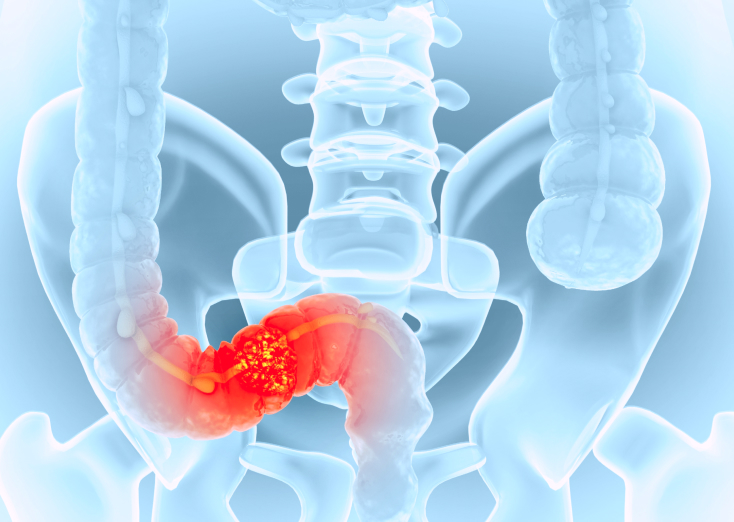Your Colorectal Health, Our Priority
With our comprehensive suite of screening services and treatment options, our experienced colorectal specialist and medical team promise you peace of mind whilst ensuring a strong and healthy colon.


Where Is TheColon And Rectum?
The colon and rectum together form the large intestine. It is the last part of the digestive system. It begins where the small intestine ends at the right lower corner of the abdomen. It travels upwards towards the liver at the right upper quadrant, then turns and goes across the abdomen to the left upper quadrant. From there, it turns downwards and travels to the left lower part of the abdomen.
It then travels towards the centre of the pelvis and goes straight down and ends at the anus. The rectum forms the last 15cm of the large intestines and lies within the pelvis. It is named as such because it is relatively straight.
Colorectal cancer is the most common cancer in Singapore, yet one of the most preventable and treatable cancers in the early stages.
We provide risk assessments, screenings, and treatments for all patients.
What Is Cancer?
How Does Colorectal Cancer Form?
What Are The Different Stages Of Colorectal Cancer?
Our clinic is dedicated to the diagnosis and treatment of colorectal cancer.
Once the stage has been determined, we will ensure the patient is well taken care of with his or her best interests in mind.
What Are The Signs And Symptoms Of Colorectal Cancer?
It is important to note that polyps, even large ones, and early cancer may not have any symptoms at all. Symptoms also depend on the site of the cancer and how far away it is from the end of the colon. When stools enter the colon from the small intestines, it is in a semi-solid state. As it stays and travels along the colon, the water in it gets absorbed by the colon and it becomes more solid.
As such, tumours in the right side of the colon do not usually cause much symptoms as the semi-solid stools can flow past most tumours quite easily. The cancer may bleed silently as it is mixed in the stools and cannot be seen with the naked eye. Patients with tumours here usually present late symptoms of anaemia (low blood levels). Symptoms of anaemia include tiredness, feeling breathless when walking the same distance or climbing stairs, and frequent giddiness.
At the left side of the colon, the stools are more solid. Therefore, any narrowing of the colon lumen results in the following disturbances of the bowel habit:
- The stools might seem to be narrower in size.
- Patients might also feel constipated as it is more difficult for the stools to squeeze through a narrower passageway. This might also alternate with diarrhoea or loose stools as this type of stools can pass through the narrowed passageway more easily.
- Patients might also notice blood coating the stools. As a general guide, the blood seen is usually dark red in colour.
For tumours in the rectum, the patient may have the sensation of incomplete passage of stools. This is because the presence of the tumour there imitates the presence of stools.
Other less specific symptoms include feeling of bloating and mucus in the stools. Pain is usually not a feature of colon and rectum cancer until it is at an advanced stage. One complication of the tumour is intestinal obstruction. This means that the entire passageway is blocked and the stools (and even flatus) are not able to pass through. This results in abdominal pain, distension and at a later stage, vomiting. Intestinal obstruction is an emergency medical condition.
Physical examination usually does not yield much signs unless the cancer is in an advanced stage. A hard mass in the abdomen is usually a sign of a large tumour. An enlarged liver signifies spread of the cancer to the liver. In some rectal cancers, a digital rectal examination is performed, where your colorectal doctor inserts a gloved, lubricated finger into the anus to pick up earlier cancers. As such, if your colorectal doctor thinks that you warrant a rectal examination, please do not decline or refuse for fear of discomfort or embarrassment.
It’s important to note that the early stages of colorectal cancer, as well as pre-cancerous polyps, often do not have any symptoms.
Should you experience any of these symptoms, please do not delay seeking medical attention.

What Are The Risk Factors Of Colorectal Cancer?
If you are at an increased risk of colorectal cancer, seek medical attention to determine a recommended screening schedule and personalised risk management advice.
How Do You Screen For Colon Cancer In Singapore?
All the different tests to examine the colon require proper cleansing of the colon. There are 3 different ways to examine the colon: colonoscopy, barium enema and computer tomography (CT) colonography (also known as virtual colonoscopy).
A colonoscopy is the ideal way of screening for colorectal cancer, due to its high levels of safety, accuracy, clarity, comfort, and convenience.
Colonoscopy
Advantages: Accuracy- highest, especially for smaller polyps
Disadvantages: Perceived invasive test. Perforation risk 0.1%
Sedation: Available
Intervention: Allows biopsy and removal of polyp
Barium Enema
Advantages: Lower perforation risk
Disadvantages: Least accurate. No biopsy. Perforation risk 0.04%
Sedation: Not available
Intervention: No
CT Colonography
Advantages: Lower perforation risk
Disadvantages: Accuracy in between barium enema and colonoscopy. Detection for polyps drop when size below 10mm. Perforation risk 0.05%
Sedation: Not available
Intervention: No
Speak to our experienced colorectal specialist for personalised advice on which screening method will be most suitable for your needs and preferences.
Other Screening Methods
When to See a Colon Cancer Doctor?
It is advisable to consult a colon cancer doctor for a detailed assessment if you experience persistent symptoms lasting for more than two weeks:
- Rectal bleeding or blood in the stool
- Persistent change in bowel patterns
- Abdominal pain or discomfort (cramps or gas)
- Fatigue or tiredness
- Unexplained weight loss

What Are The Treatments For Colon Or Colorectal Cancer?
Surgery is the only treatment that a colorectal surgeon can offer for the definite cure of colon and rectum cancer. Other treatment modalities such as chemotherapy and radiation therapy may be used as additional treatment in reducing the risk of recurrence but do not consistently offer a cure.
The principle behind surgery for colon and rectum cancer is to remove the segment of colon or rectum with the cancer together with the adjacent area containing the lymph nodes where the cancer would initially spread. After the segment of the colon or rectum with the cancer is removed, the intestines are joined back to restore continuity so that the patient can continue to pass motion in the normal manner.
In cases where the tumour is very close to or invading the anus, the anus would have to be removed to ensure that the cancer is completely excised.
In certain cases of rectal cancer, the colorectal surgeon may also decide to pull out a temporary stoma. This is because the joint (anastomosis) for the colon to anus has a higher rate of non-healing. Having the temporary stoma acts to divert stools away from the anastomosis so that even if it does not heal properly, there would not be any leakage of stools into the abdominal cavity and cause major complication and infection. In these cases of temporary stoma, the stoma will be closed about 6 weeks to 3 months later.
In the hands of an experienced colorectal cancer surgeon, the diseased portions of the colon or rectum can be safely removed while minimising post-operative discomfort and inconvenience.
Different Types Of Colon Surgery
On the other hand, non-surgical treatments are usually used together to enhance the cure rates of surgery, or for controlling the cancer in cases where it cannot be cured.
A colorectal cancer surgeon will determine the most suitable treatment plan for each individual.
Non-Surgical Treatments
Chemotherapy
Chemotherapy is used as an adjuvant therapy. This means that it is used in support of surgery which is the main modality of treatment. Chemotherapy is usually recommended for stage 3 and stage 4 cancers.
Radiation Therapy
Radiation therapy is also an adjuvant therapy. It is usually used for rectal cancers that are more locally advanced. It is usually not required for colon cancer. Under certain special circumstances, your doctor may recommend chemotherapy and/or radiation therapy before surgery.
FAQs About Colorectal Cancer
Is Colon Cancer Common in Singapore?
Can Colorectal Cancer Be Prevented?
When Should You Go For a Colorectal Cancer Screening?
Is colon cancer hereditary?
What does colon cancer pain feel like?
Is colon cancer fast or slow growing?
Our Colorectal SurgeonColorectal Specialist

Dr Ho Kok Sun
Consultant Colorectal & General Surgeon
MBBS (Singapore), M Med (General Surgery) (Singapore)
FRCS (General Surgery) (Edinburgh), FAM (Singapore)
Dr Ho Kok Sun has been committed to treating colorectal cancer in Singapore for over a decade. He was the past President of the ASEAN Society of Colorectal Surgeons and the Society of Colorectal Surgeons (Singapore), as well as a founding member of the Eurasian Colorectal Technologies Association. Dr Ho was actively involved in the training of medical students and residents, and has published widely in reputable journals and book chapters. He believes that treatment should always be personalised to the patient’s needs.

